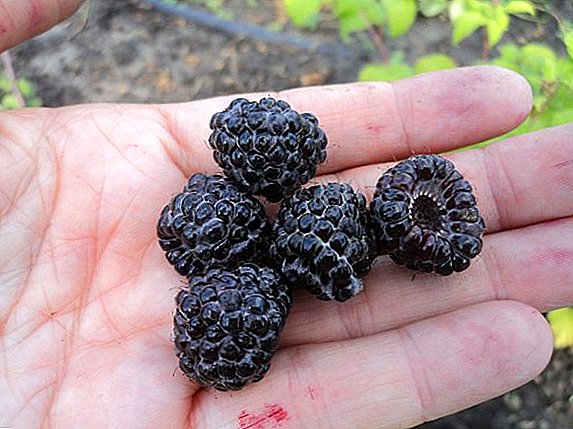 With the approach of spring and summer, gardeners and gardeners begin active work in the cultivation of the soil, planting seed and growing the future crop. To ensure that all human efforts are not in vain, and the plants are not later damaged by pests, the safety of their fruits should be thought about in advance and selected a preparation that will help avoid many problems. One of the most effective means against various insects is the drug "Nurell-D", so let's take a closer look at it and tell you a brief instruction on how to use it in practice.
With the approach of spring and summer, gardeners and gardeners begin active work in the cultivation of the soil, planting seed and growing the future crop. To ensure that all human efforts are not in vain, and the plants are not later damaged by pests, the safety of their fruits should be thought about in advance and selected a preparation that will help avoid many problems. One of the most effective means against various insects is the drug "Nurell-D", so let's take a closer look at it and tell you a brief instruction on how to use it in practice.
"Nurell-D": what is this drug and against whom it is effective
"Nurell-D" is an insecticide with a broad spectrum of activity against the pests of the garden and garden, reliably protecting crops from aphids, leaf beetles, weevils, drunk, sawflies, flea beetles, grain ground beetles, thrips, silkworms, moths, moths, bedbugs, corn tortilla, shchitovki, squirrel, meadow moth and locust family. Usually the product is produced in the form of a concentrated emulsion in 7 ml ampoules. 
"Nurell-D" is effective against 30 types of various pests, which makes it a unique insecticide
Active ingredient and mechanism of action
The main active ingredient of the drug are chlorpyrifos and zipermitrin, the concentration of which is respectively 500 and 50 grams per 1 liter of the finished insecticide.
The mechanism of action "Nurell-D" is quite extensive, since it has a contact, intestinal, locally-systemic, fumigant and repellent effect on the organism of the pest.
Also for the rescue of plants from pests will be useful such insecticides as: "Bi-58", "Aktara", "Omayt", "Alatar", "Aktofit", "Fitoverm", "Konfidor", "Kinmiks".
The benefits of this drug
The drug "Nurell-D" has the following advantages:
- effective against various types of harmful insects;
- characterized by the ability to quickly penetrate into plant cells and spread throughout all its land and underground parts, which allows to destroy hidden living parasites, as well as those who hide under dense foliage and creeping crops;
- it is used both against imago and against larvae at all stages of development;
- long term protection;
- the beneficial effect is manifested even in not very favorable conditions, including during precipitation after treatment.

Preparation of the working solution and instructions for its use
The working solution is prepared in 2 stages:
- First, the required amount of concentrate is diluted in about 1 liter of water with continuous stirring until complete dissolution;
- then, the solution is brought to the desired volume with water and the optimum concentration.
- pear, apple, cherry, plum - 10 ml,
- grapes - 10 ml,
- currants, raspberries and other shrubs - 8 ml,
- cabbage, beets and other vegetables - 12 ml.

Important! For processing 1 hectare of plantations of fruit and berry crops and vegetables, approximately 300 ml of solution will be required
The impact rate and the period of the protective action of the drug
The impact rate of “Nurell-D” is impressive: when it hits the body of the parasite, it immediately dies, and the concentrate, diluted according to the recommended norms, instantly penetrates into the plant tissue, within a day or two destroys the individuals remaining on the vegetation. Treating trees and shrubs is carried out in different periods of the growing season, as well as in spring, before bud break, other plantations are treated as necessary, taking into account the recommendation not to carry out garden work for 10 days after spraying.
It will be useful to know what insecticides are, their description and characteristics of the main species.
The period of the protective action of the working solution is approximately 2 weeks after the treatment of the plantations.
Combination with other drugs
The use of the concentrate can be combined with the use of many growth regulators, fungicides and insecticides, in particular with "Appin", "Ribav-Ekstroy" and "Zircon". The effectiveness of the active substance is lost only when mixed processing with copper compounds or alkaline solutions. For an optimal result and in order to avoid unpleasant consequences, in each case the mixable solutions should be checked for individual compatibility. 
Important! Treatment of 1 hectare of stands with a complex of liquid fertilizers and insecticides will require approximately 150 ml of solution.
Toxicity: Precautions
The concentrate is moderately hazardous (it is classified as hazard class 3), but it is extremely harmful for the population of bees, besides it is prohibited to use it near the fishing zones.
The working solution is prepared immediately before spraying, it is not necessary to allow its long-term storage in finished form. In addition, the processing of agricultural land should be carried out with the use of personal protective equipment: a mask, gown and gloves. During the manipulation of the solution is strictly prohibited to drink, eat food and smoke. At the end of treatment, you should change your clothes, wash your hands thoroughly with soap and wash, and rinse the mouth. Empty containers should be incinerated far from the location of people, in order to avoid inhalation of products of combustion. 
Did you know? Large areas of grain crops are treated using aircraft technology, while the consumption of the drug is 1 liter per 1 hectare.
First aid for poisoning
After getting onto the skin, the “Nurell-D” solution should be washed off with water or soda solution, avoiding rubbing, and if it gets into the eyes it should be washed with running water in the open state every 15-20 minutes. If a person, after the spraying of plantings, has developed nausea, weakness or general malaise, vomiting has begun, then he should be urgently brought to fresh air, unbuttoned clothes on his chest to ensure free breathing and drink clean water. After providing first aid for poisoning, you should seek qualified medical advice in order to avoid serious complications. 
Storage conditions
The drug should be stored in a dry room, the temperature of which is within + 5 ... +20 ° C. Storage "Nurell-D" should be carried away from drugs and food, without access to the place of storage of children and animals.












